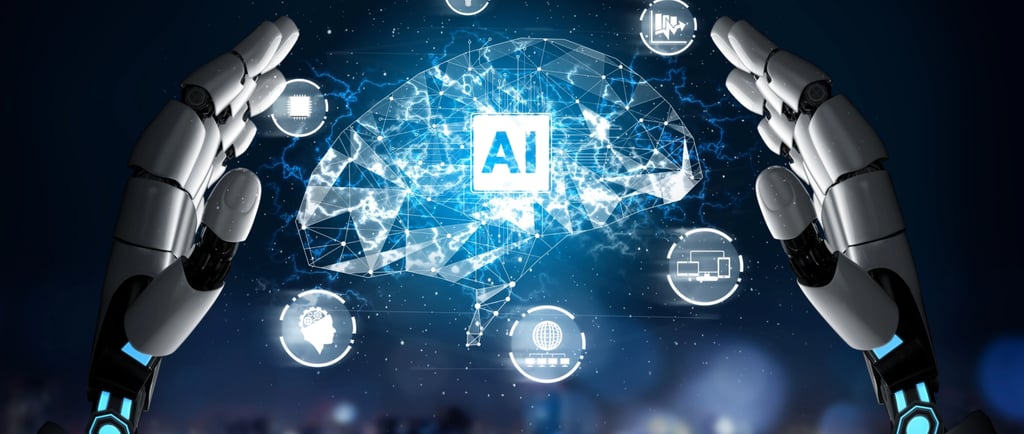The Rise of AI in Marketing: Transforming the Future of the Industry
Explore how AI is transforming marketing, from personalisation and data insights to advertising, and how agencies can leverage it.
7/11/20255 min read


Artificial Intelligence (AI) has swiftly become one of the most transformative forces in the marketing landscape. From personalized customer experiences to predictive analytics, AI is reshaping how brands engage with their audiences, optimize campaigns, and drive conversions. As AI technology continues to evolve, marketing agencies must adapt to stay competitive in an ever-changing digital world. This blog explores how AI is revolutionizing marketing, the benefits it brings, and how agencies can leverage it to stay ahead of the curve.
The Evolution of AI in Marketing
AI’s integration into marketing has been a gradual process, evolving from basic automation tools to highly sophisticated machine learning algorithms. In the early days, marketers relied on manual data analysis and basic rule-based automation to streamline processes. Today, AI-driven tools can analyze vast amounts of data, detect patterns, and generate insights in real time, allowing marketers to make data-driven decisions with unprecedented precision.
A few key technological advancements have fueled AI’s rise in marketing:
- Machine Learning (ML): Algorithms that improve over time, enabling better audience targeting and personalized recommendations.
- Natural Language Processing (NLP): AI’s ability to understand, interpret, and generate human language, enhancing customer interactions via chatbots and voice search.
- Predictive Analytics: AI-powered forecasting tools that predict customer behavior, enabling more effective campaign planning.
- Computer Vision: AI’s ability to analyze images and videos, helping brands optimize visual content strategies.
How AI is Transforming Marketing
1. Personalization at Scale
One of AI’s biggest contributions to marketing is hyper-personalization. AI analyzes customer behavior, preferences, and past interactions to deliver tailored content, recommendations, and product suggestions. Platforms like Netflix and Amazon use AI to suggest content and products based on individual preferences, significantly boosting engagement and conversions.
AI-driven personalization also extends to email marketing, website experiences, and social media advertising. For instance, dynamic email campaigns powered by AI ensure that customers receive content tailored to their interests, increasing open and click-through rates.
2. Enhanced Customer Insights and Data Analytics
Traditional data analysis methods are time-consuming and often fail to uncover deep insights. AI, however, can process vast amounts of data in real time, detecting patterns and trends that might otherwise go unnoticed.
With AI-driven analytics, marketers can:
- Identify high-value customer segments.
- Predict future purchasing behavior.
- Optimize content based on engagement trends.
- Improve attribution modeling for better budget allocation.
Tools like Google Analytics 4 and Adobe Sensei harness AI to provide deeper insights into user behaviour, enabling marketers to refine their strategies and maximize ROI.
3. Chatbots and Conversational Marketing
AI-powered chatbots are revolutionizing customer service and engagement. By leveraging NLP, chatbots can provide instant, human-like responses to customer inquiries, improving response times and enhancing user experience.
Brands like Sephora and H&M have implemented AI chatbots on their websites and messaging apps, assisting customers with product recommendations, order tracking, and general inquiries. These AI-driven assistants reduce the burden on human customer service teams while improving customer satisfaction and retention.
4. Content Generation and Optimization
AI is not just analyzing data; it’s also creating content. AI-powered tools like OpenAI’s ChatGPT, Jasper, and Copy.ai are being used to generate high-quality blog posts, ad copy, and product descriptions.
While human creativity remains irreplaceable, AI can assist by:
- Automating repetitive content creation tasks.
- Generating data-driven content ideas.
- Optimizing headlines and subject lines for maximum engagement.
- Personalizing content for different audience segments.
AI-driven content creation is particularly useful for scaling marketing efforts while maintaining consistency across multiple platforms.
5. AI-Powered Advertising
AI is revolutionizing digital advertising by making campaigns more efficient and targeted. Programmatic advertising, powered by AI, automates the buying and placement of ads in real-time, ensuring that the right audience sees the right message at the right time.
Platforms like Google Ads and Facebook Ads use AI-driven algorithms to:
- Optimize bidding strategies.
- Identify high-performing ad creatives.
- Retarget users based on behavioral data.
- Improve audience segmentation for better ad placements.
By leveraging AI, marketers can achieve higher ROI on their advertising spend while reducing waste on ineffective ad placements.
6. Voice Search and AI Assistants
The rise of voice search has further emphasized AI’s role in marketing. With voice assistants like Siri, Alexa, and Google Assistant becoming household staples, optimizing content for voice search is crucial.
AI-driven voice search optimization involves:
- Understanding natural language queries.
- Adapting content for conversational search terms.
- Enhancing local SEO for voice-based searches.
As voice search continues to grow, brands that embrace AI-powered voice search optimization will gain a competitive edge.
7. AI-Driven Visual Recognition
AI-powered visual recognition technology is enabling brands to analyze and optimize images and videos for better engagement. Tools like Google Lens and Pinterest Lens allow users to search for products using images, making visual search an emerging trend in e-commerce.
Brands are leveraging AI for:
- Identifying trending visual content.
- Enhancing image recognition for product discovery.
- Optimizing video content for better reach and engagement.
By integrating AI-driven visual recognition, marketers can create more compelling and interactive experiences for their audiences.
Challenges and Ethical Considerations of AI in Marketing
While AI offers numerous benefits, it also presents challenges and ethical concerns that marketing agencies must address.
1. Data Privacy and Security
With AI relying heavily on user data, concerns about data privacy and security have grown. Marketers must ensure compliance with regulations like GDPR and CCPA to protect consumer data and maintain trust.
2. Bias in AI Algorithms
AI systems can inadvertently reflect biases present in their training data. Biased algorithms may lead to unfair targeting or exclusion of certain demographics. Ensuring diversity in AI training data is essential for ethical marketing practices.
3. The Human Touch vs. Automation
While AI enhances efficiency, it cannot replace human creativity and emotional intelligence. Marketers should use AI as a complement to human decision-making rather than a complete replacement.
4. Dependence on AI Tools
Over-reliance on AI can lead to complacency, where marketers trust AI-generated insights without critical evaluation. It’s important to combine AI-driven insights with human expertise for well-rounded strategies.
How Marketing Agencies Can Leverage AI Successfully
For marketing agencies looking to integrate AI into their strategies, here are key steps to take:
1. Invest in AI-Driven Tools: Platforms like HubSpot, Salesforce Einstein, and Persado offer AI-driven insights and automation to enhance marketing efforts.
2. Train Teams on AI Adoption: Educating teams on AI capabilities and limitations ensures smooth integration into workflows.
3. Focus on Data Quality: AI is only as good as the data it analyzes. Ensuring clean, accurate, and diverse data sets improves AI’s effectiveness.
4. Combine AI with Human Creativity: Use AI for automation and insights but rely on human creativity for storytelling and brand voice.
5. Monitor AI Performance and Adjust Strategies: Regularly assess AI-driven initiatives to ensure they align with business goals and deliver optimal results.
The Future of AI in Marketing
AI’s role in marketing will only continue to expand, with advancements in deep learning, generative AI, and augmented reality shaping the next phase of marketing innovation. As AI becomes more sophisticated, brands that embrace it will gain a competitive advantage by delivering more personalized, efficient, and impactful marketing campaigns.
Marketing agencies that strategically integrate AI into their operations will not only improve their effectiveness but also future-proof their businesses in an AI-driven world. The key is to stay informed, experiment with AI-powered solutions, and strike the right balance between automation and human creativity.
The AI revolution in marketing is here.
What We Do
Empowering small businesses through creative marketing solutions. Our Services.
CONTACT
JOIN OUR MAILING LIST
© 2025. All rights reserved.
Connect With Us
